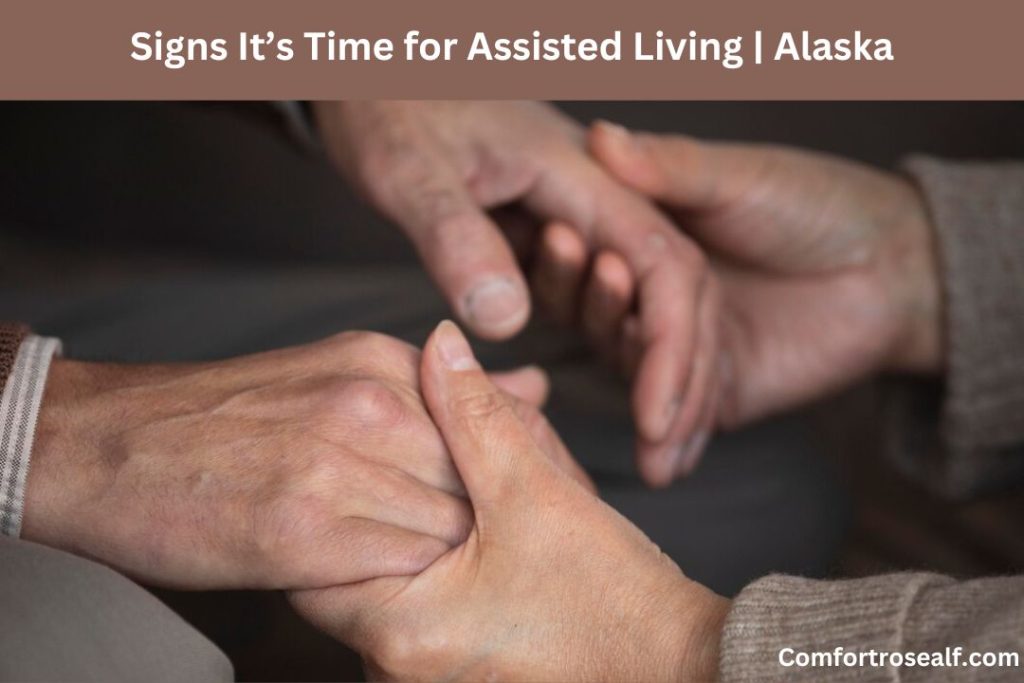Aging is a natural part of life, and as our loved ones grow older, their needs evolve. While many seniors prefer to remain independent for as long as possible, there comes a time when they may require additional care and support. Determining when it’s time for assisted living can be challenging, both emotionally and practically.

At Comfort Rose Assisted Living Facilities, we understand how difficult this decision can be. Families often struggle with guilt, uncertainty, and even resistance from their loved ones. However, recognizing the signs that an elderly parent or relative needs assisted living can ensure they receive the care, comfort, and social engagement they deserve.
In this comprehensive guide, we’ll discuss the key indicators that suggest a senior may benefit from assisted living and how making the transition can improve their overall well-being.
Declining Physical Health and Mobility Issues
One of the most common reasons families consider assisted living is a noticeable decline in their loved one’s physical health. As we age, our bodies become more fragile, and everyday activities that were once simple may now pose a risk.
Signs that physical health is declining:
- Frequent falls, balance issues, or difficulty walking
- Noticeable bruises or injuries from falls or accidents
- Chronic pain or worsening health conditions such as arthritis or osteoporosis
- Struggles with getting in and out of bed, chairs, or bathtubs
- Reduced strength and stamina leading to fatigue
- Trouble managing medical devices (hearing aids, oxygen tanks, walkers, etc.)
Falls are one of the leading causes of injury among seniors. If your loved one is at risk of falling at home, assisted living can provide a safer environment with handrails, emergency response systems, and trained caregivers to help with mobility.
Difficulty Managing Daily Activities (ADLs)
Activities of Daily Living (ADLs) refer to essential self-care tasks that a person must perform to maintain health and hygiene. When seniors struggle with these tasks, their quality of life can decline significantly.
Signs that daily activities are becoming difficult:
- Wearing the same clothes for multiple days or struggling to get dressed
- Poor personal hygiene, such as infrequent bathing or grooming
- Strong body odour or dirty clothes
- Difficulty using the restroom or incontinence issues
- Struggles with meal preparation, leading to skipped meals or poor nutrition
At Comfort Rose Assisted Living Facilities, trained caregivers assist with dressing, bathing, grooming, and other essential daily tasks, ensuring that residents maintain their dignity and personal hygiene.
Forgetfulness, Memory Loss, and Cognitive Decline
Mild forgetfulness is normal with aging, but when memory loss begins to affect daily life, it may indicate a more serious issue like dementia or Alzheimer’s disease. Cognitive decline can make it dangerous for a senior to live alone, especially if they forget to take medications, turn off appliances, or recognize familiar faces.
Signs of cognitive impairment:
- Forgetting to pay bills or manage finances
- Losing track of appointments or taking medications incorrectly
- Confusion about time, place, or recent events
- Frequently misplacing items and accusing others of stealing them
- Wandering or getting lost in familiar places
- Difficulty following conversations or repeating the same questions
Memory care programs at assisted living facilities provide structured routines, cognitive stimulation, and a safe environment for seniors experiencing memory loss.
Increased Isolation and Loneliness
Social interaction is essential for mental and emotional well-being. If your loved one is withdrawing from social activities, avoiding phone calls, or no longer engaging with friends and family, it could be a sign of depression or loneliness.
Signs of social withdrawal:
- Lack of interest in hobbies or activities they once enjoyed
- Avoiding family gatherings or social events
- Expressing feelings of sadness, boredom, or hopelessness
- Increased irritability or mood swings
Loneliness can lead to mental health concerns, including depression and anxiety. Assisted living communities encourage social engagement through group activities, entertainment, and companionship. At Comfort Rose Assisted Living Facilities, we offer a variety of social events to keep residents active and engaged.
Poor Nutrition and Unhealthy Eating Habits
Proper nutrition is crucial for maintaining energy levels, supporting the immune system, and preventing chronic illnesses. Many seniors struggle with grocery shopping, meal preparation, or simply remembering to eat.
Signs of poor nutrition:
- Weight loss or noticeable frailty
- Expired or spoiled food in the refrigerator
- Lack of variety in meals (eating only processed or microwaveable foods)
- Difficulty chewing or swallowing food
- Signs of dehydration, such as dry skin, dizziness, or confusion
Assisted living communities provide nutritious meals tailored to dietary needs, ensuring that seniors receive daily balanced and healthy food.
Neglecting Household Responsibilities and Finances
Managing a home requires time, effort, and organization. If a senior struggles to keep up with household chores or financial responsibilities, it may indicate that they need additional support.
Signs of household neglect:
- Unpaid bills, late payment notices, or financial scams
- Cluttered or messy living space
- Unopened mail or unfiled important documents
- Expired medications or an unorganized medicine cabinet
- Accumulation of dust, mold, or pests in the home
At Comfort Rose Assisted Living Facilities, we take the stress out of home maintenance, allowing seniors to enjoy a clean and comfortable living space without the burden of housekeeping.
Signs of Caregiver Burnout
Family members who take on the role of caregiver often experience stress, exhaustion, and emotional strain. If caregiving becomes overwhelming, it may be time to consider assisted living.
Signs of caregiver burnout:
- Feeling physically and emotionally drained
- Neglecting personal health and well-being
- Increased frustration, irritability, or guilt
- Struggling to balance work, family, and caregiving responsibilities
Choosing assisted living doesn’t mean giving up on your loved one—it means ensuring they receive the professional care and attention they deserve while allowing family members to focus on their relationship rather than caregiving duties.
Making the Transition to Assisted Living
If you recognize these signs in your loved one, it may be time to explore assisted living options. When approached with the right mindset, transitioning to assisted living can be a positive and life-enhancing experience.
Steps to Ease the Transition:
Have an open conversation – Discuss concerns with your loved one and involve them in decision-making.
Visit assisted living communities – Tour different facilities to find the best fit for your loved one’s needs and preferences.
Involve healthcare professionals – Seek advice from doctors or geriatric specialists for recommendations on the level of care required.
Plan the move carefully – Help your loved one pack and personalize their new living space with familiar items.
At Comfort Rose Assisted Living Facilities, we provide compassionate care, personalized assistance, and a welcoming environment for seniors. We aim to ensure that residents feel safe and supported at home.
If you’re considering assisted living for a loved one, contact us today to learn more about our services and schedule a visit. Let us help you make this critical transition with care and confidence.
